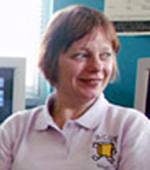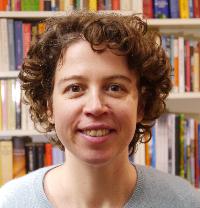| Pages in topic: < [1 2 3 4] > | Esperanto - how 'alive' is it? How long to learn? Any online courses? Thread poster: Stefanie Sendelbach
|
|---|
kanajlo
Local time: 01:23
Esperanto to English
+ ...
| Small Esperanto dictionary of items commonly found in the home | Jul 3, 2004 |
The definitions are given in Esperanto and the equivalent words are listed in several national languages (an = angla = English).
Hejma Vortaro
http://www.helsinki.fi/~jslindst/hejmvort.html
| | | | Krys Williams 
United Kingdom
Local time: 06:23
Member (2003)
Polish to English
+ ...
| I did a postal course | Jul 3, 2004 |
I learned Esperanto through a postal course run by the British Esperanto Association - this was in 1984. Later I went on to do the BEA Diploma, which is equivalent to first-year university studies and was a lot of fun.
The best thing about Esperanto for me is the excellent literature that has developed within the movement. My great hero is William Auld, one of the greatest Esperanto poets ever and a lovely man with whom I was privileged to meet and correspond. However, there are ... See more I learned Esperanto through a postal course run by the British Esperanto Association - this was in 1984. Later I went on to do the BEA Diploma, which is equivalent to first-year university studies and was a lot of fun.
The best thing about Esperanto for me is the excellent literature that has developed within the movement. My great hero is William Auld, one of the greatest Esperanto poets ever and a lovely man with whom I was privileged to meet and correspond. However, there are many, many others. I also wrote poetry in my time. I found the flexibility of Esperanto was wonderful in allowing expressivity. My poems found a measure of success among some people, gaining me some prizes, although they made me enemies in other quarters It is all the more amazing because I cannot write poetry at all in English! I was also in a relationship for a number of years which was conducted totally in Esperanto
Unfortunately, due to a number of concurrent changes in my life circumstances, I stopped being an active Esperantist in 1996.
Krys ▲ Collapse
| | | | Stefanie Sendelbach 
Germany
Local time: 07:23
Member (2003)
English to German
+ ...
TOPIC STARTER | Esperanto cosmos | Jul 4, 2004 |
Hi Krys,
Thanks for joining in and sharing your Esperanto experience with us. I never knew there was such a huge literary scene behind Esperanto. Anyway, I never expected any of the developments that Esperanto has achieved. I am really impressed by the huge mass of websites, books, and involved people that I keep finding about the language.
Well, so far, I have only mastered the plural, accusative and some vocabs ... See more ... See more Hi Krys,
Thanks for joining in and sharing your Esperanto experience with us. I never knew there was such a huge literary scene behind Esperanto. Anyway, I never expected any of the developments that Esperanto has achieved. I am really impressed by the huge mass of websites, books, and involved people that I keep finding about the language.
Well, so far, I have only mastered the plural, accusative and some vocabs But luckily, there are all the courses out there. But luckily, there are all the courses out there.
Cheers,
Stefanie ▲ Collapse
| | | | Stefanie Sendelbach 
Germany
Local time: 07:23
Member (2003)
English to German
+ ...
TOPIC STARTER | Your experience | Jul 4, 2004 |
Krys Bottrill wrote:
I learned Esperanto through a postal course run by the British Esperanto Association - this was in 1984. Later I went on to do the BEA Diploma, which is equivalent to first-year university studies and was a lot of fun.
Hi Krys,
Would you mind telling me a little more about your experience with learning Esperanto? Like: How long did that postal course last? Was it the only Esperanto course you took or did you take part in other programmes as well?
Can you tell me more about the BEA Diploma?
After how much time did you actually start conversing and even writing your own poems and stories in Esperanto?
Thanks,
Stefanie
| | |
|
|
|
kanajlo
Local time: 01:23
Esperanto to English
+ ...
| | Comments from a first language Esperantist | Jul 5, 2004 |
Yes, that's right - I'm one of those strange creatures known as a 'denaska esperantisto'. The first words I ever heard were 'saluton bebo', most of my birth congratulation cards were written in Esperanto from my parents' friends in the movement and my first word was 'biskvito' rather than the English 'biscuit'.
I remember being surprised as a child to discover that not everyone in the world spoke Esperanto - the myriad visitors who passed through our home from around the world cert... See more Yes, that's right - I'm one of those strange creatures known as a 'denaska esperantisto'. The first words I ever heard were 'saluton bebo', most of my birth congratulation cards were written in Esperanto from my parents' friends in the movement and my first word was 'biskvito' rather than the English 'biscuit'.
I remember being surprised as a child to discover that not everyone in the world spoke Esperanto - the myriad visitors who passed through our home from around the world certainly did! Although both my parents were British, they only spoke Esperanto at home, so it was almost unthinkingly that it became my first language.
As a child, of course, I took the language for granted. It was only as a teenager when I started to travel on my own that I realised the real potential of being at an event and chatting with people from 20 different countries in the space of an afternoon.
In fact, I have many friends, who don't speak a word of any of the languages I speak except for Esperanto, but it's never been a problem to us. Only last night I had a gloating phone call from a friend in Greece (also Esperanto-speaker from birth) who I've written to since we were both 7 or 8 years old. She phoned to gloat over Greece's win in Euro 2004 (!) Neither of us are particular soccer fans, but what a topical way to use the language!
Has it helped me learn other languages? There's plenty of evidence to suggest this and in my case, I'd say yes. Mainly, because Esperanto is so flexible, it's given me the ability to 'play' with language. When I trained as a translator, that inbred understanding that not all languages express things in the same way certainly helped me in being creative with whichever language I was working in.
What I would say is certain is that being raised with the Esperanto 'ethos' of neutrality and equality has certainly had a profound effect on me. Although I appreciate my British (Welsh & English)heritage, I do tend to get a bit Socratic in considering myself a 'citizen of the world' (at least, the Esperanto-speaking one!)
Does it make Esperanto less neutral to have native Esperanto speakers floating around? Interesting question. I think we are as committed to the neutrality of Esperanto as other speakers - after all, we've spent our whole lives sticking up for this principle. I've often posed this question to my friends who have learnt Esperanto and on the whole they say that they don't find a difference.
Hope this is of interest to you.
Heather ▲ Collapse
| | | | Krys Williams 
United Kingdom
Local time: 06:23
Member (2003)
Polish to English
+ ...
| Hi Heather! Nice to meet up with you again here.! | Jul 5, 2004 |
You might remember me under my name in another life - Krys Ungar.
Like you, I think Esperanto helped me to become a translator. In fact, I have no other formal linguistic training, having done science qualifications.
Krys
| | | |
I was going to say hi to you in my previous message but got carried away with the flow and forgot! Nice to see you.
I agree - the flexibility of Esperanto really helps you think differently about language in general. Your comments about poetry really illustrate this.
| | |
|
|
|
Krys Williams 
United Kingdom
Local time: 06:23
Member (2003)
Polish to English
+ ...
| My experience - as requested | Jul 5, 2004 |
sundari wrote:
Would you mind telling me a little more about your experience with learning Esperanto? Like: How long did that postal course last? Was it the only Esperanto course you took or did you take part in other programmes as well? Can you tell me more about the BEA Diploma? After how much time did you actually start conversing and even writing your own poems and stories in Esperanto?
Hello Stephanie,
Long - read at your own risk!!! 
I took up the course in winter 1984 to stop my brain from wasting away when I was shut up at home with a newborn baby and another one 13 months older. It's a long while back now, and difficult for me to remember. However, I think the beginners course consisted of 10 lessons, and I did them at a rate of one a week, more or less. The lessons introduced the principles of Esperanto grammar and provided a start with vocabulary. The course was extremely simple. After that, I think I went on to a combined intermediate-advanced fast track course, which included more advanced grammar, plus some essay writing etc.
I think I was able to construct my own basic sentences within a month of starting to learn the langugage. A few months later, I joined a local group and starting having elementary conversations. In 1986, I met someone who wrote poetry quite a lot, and we were in a sort of relationship for the next 11 years or so. This person started telling me about the elements of poetry and I got interested. I made a few attempts of my own, and he gave me some quite constructive critiques. In 1988, I secretly submitted 3 poems to the literary competition at the World Esperanto Congress and won the New Talent Prize. I went on to win 1st and 3rd poetry prizes in 1989, essay prize in 1990, 2nd poetry prize 1995 - but by then I was already retreating from a public Esperanto presence. In the meantime though, I had also won a number of poetry and essay prizes at the International Floral Games of the Catalan Esperantists, and was pronounced Master of the Floral Games as a result.
The diploma came midway between all that. Basically, you have to research material for longish essays on a number of topics, including literature and history. I did one essay on the first female poet in Esperanto; a comparative study of how two outstanding poets from two different generations treated women in their poetry; a Jungian interpretation of a verse drama - umm, maybe some other stuff too, but I forget. I don't know if the Diploma still exists or not.
I also co-guided a week's holiday in Wales for 40 Esperantists after the 1989 World Congress in Brighton (never again!); spent some time as editor of the Science and Arts columns in Monato, a general magazine published every month, gave talks on various topics to E groups around the place, and presented an evening's entertainment consisting of my poems and other people's songs in Esperanto - all thematically linked. I also translated a number of songs and poems, as well as starting a translation of Under Milkwood (Dylan Thomas) and another of Cat's Cradle (Vonnegut), but ran out of steam when I started working full time with a 2-hour commute each end.
And then, in 1996, I stopped dead, for a number of reasons.
Krys
| | | | kanajlo
Local time: 01:23
Esperanto to English
+ ...
| | How many people use Esperanto? | Aug 2, 2004 |
[quote]sundari wrote:
> How many people do actually use it to converse with others? My impression (which is not worth much) tells me that Esperanto is only used by very few people.
I've been using Esperanto since 1994. In March 2003 I started an MS-Access database of people I chat with on the net in Eo. Today, a little over a year later, I have 977 names from 74 countries: impressive -- both in number and in diversity.
Regards
A Giridhar RAO
Hyderabad, India
| | | | | I correspond in Esperanto 8 hours a day ... | Aug 4, 2004 |
Krys Bottrill wrote:
I also co-guided a week's holiday in Wales for 40 Esperantists after the 1989 World Congress in Brighton (never again!); spent some time as editor of the Science and Arts columns in Monato, a general magazine published every month, ...
Krys
and Krys was one of my best editors ever!
If you want to know how "alive" is Esperanto, just come and sit next to me tomorrow morning when I open my mail
Paul (editor-in-chief of Monato)
| | |
|
|
|
Krys Williams 
United Kingdom
Local time: 06:23
Member (2003)
Polish to English
+ ...
| Thank you, Paul! | Aug 4, 2004 |
And Paul was terribly patient when I took far too long over the job
| | | | Stefanie Sendelbach 
Germany
Local time: 07:23
Member (2003)
English to German
+ ...
TOPIC STARTER | Thank you, everybody!! | Aug 6, 2004 |
For all your suggestions, links, stories, experiences shared and especially for the support that you offered. Very much appreciated. Dankon dankon!!
| | | | kanajlo
Local time: 01:23
Esperanto to English
+ ...
| Esperanto is very much alive. Vivu Esperanto! | Nov 30, 2005 |
| | | | | Pages in topic: < [1 2 3 4] > | To report site rules violations or get help, contact a site moderator: You can also contact site staff by submitting a support request » Esperanto - how 'alive' is it? How long to learn? Any online courses? | Anycount & Translation Office 3000 | Translation Office 3000
Translation Office 3000 is an advanced accounting tool for freelance translators and small agencies. TO3000 easily and seamlessly integrates with the business life of professional freelance translators.
More info » |
| | TM-Town | Manage your TMs and Terms ... and boost your translation business
Are you ready for something fresh in the industry? TM-Town is a unique new site for you -- the freelance translator -- to store, manage and share translation memories (TMs) and glossaries...and potentially meet new clients on the basis of your prior work.
More info » |
|
| | | | X Sign in to your ProZ.com account... | | | | | |








